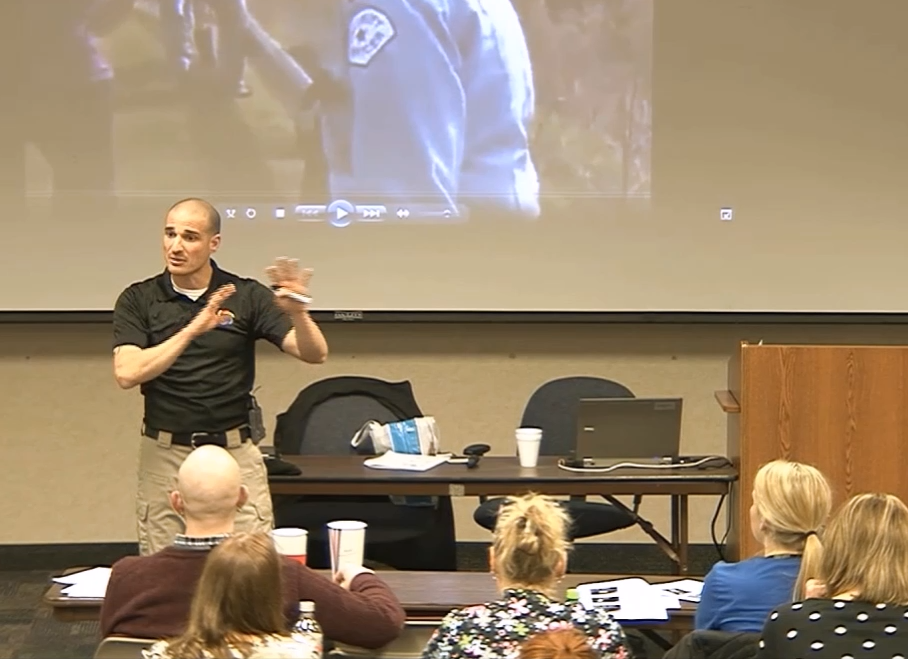Verbal Crisis Prevention & Intervention Training®

Verbal De-escalation Training
- Large Group Session / Multi-Session Discounts Available
Verbal Crisis Prevention & Intervention Training®
-
Verbal De-escalation training
-
Non-violent, non-confrontational techniques
-
Competency-based for enhanced retention
-
Certificates upon completion
-
Certified Instructor Certification Available!
Meets and Exceeds Best Practice Guidelines of: Joint Commission, CARF, CMS, CWLA and others. Utilized across the USA and internationally. (2/4/6hr Options Available)
Questions? Contact Us
CCG’s Crisis Prevention and Intervention Training ® provides a highly engaging and interactive training experience. Use of lecture, video, multimedia instruction, combined with practical exercises and final testing. Length of course can be customized based on organization, depth of training desired, scheduling, and budget demands. This course has been heavily utilized across the USA, Canada and Internationally, and is found in nearly every type of workplace setting.
Topics include:
- Understanding Precursors To Crisis
- Motivating Persons In Crisis
- Handling Passive Non-Compliance
- Professional Distancing
- Building Rapport
- Trauma Informed Care And How It Relates To Crisis Intervention
- Remaining Unbiased During Interventions
- Maintaining Your Calm During Crisis
- Recognizing When Challenging Situations Are Leading To Violence
- Interpreting body language and recognizing signs of crisis and escalation
- Effective tips for Conflict Resolution
- The 5 Steps to De-escalation™
- The SOLVE Solution™
- And more–
Training includes:
- Course handbook
- Additional PDF course handouts
- Final review and testing
- Certificate of completion
This course is in alignment with Best Practices, and meets and/or exceeds Accreditation standards and guidelines for organizations such as;
- Joint Commission on Accreditation
- OSHA General Duty / Workplace Violence Prevention Clause
- Commission on Accreditation of Rehabilitation Facilities (CARF)
- Centers for Medicare/Medicaid (CMS)
- US Dept. of Education
- Child Welfare League of America (CWLA)
More questions? Please call!

Verbal & Physical Intervention Training
- Large Group / Multi-Session Discounts Available
Verbal & Physical Crisis Prevention & Intervention Training®
-
Verbal & Physical Crisis Intervention
-
Safe physical restraint training
-
Custom Length Options Available
-
Safely stop, contain, and prevent physical harm
-
Maintains dignity and respect for all
-
Non-violent & least restrictive techniques
-
Virtual Options Now Available!
There is a practical review and competency-based testing upon conclusion of course for certification. Certification lasts for one year.
(Technique Details: HERE) Questions? Contact Us
Building off the aforementioned Crisis Prevention and Intervention Training®, CCG Master Instructors provide additional instruction on the highly effective, realistic, and proven physical intervention passive restraint techniques for emergencies.
When organizations are faced with challenging and/or physically aggressive behavior, staff need to be fully prepared to prevent, mitigate, and contain such behavior through safe and realistic methods. CCG’s proprietary physical intervention methods combine industry recognized Best Practices with the most advanced physical protection and restraint methodology in the industry.
Techniques taught empower employees to safely protect themselves and the individual in crisis, while eliminating the chance of harm within seconds. Proven across the country in a myriad of highly violent and dangerous environments, the Calm Every Storm physical intervention techniques are unparalleled in effectiveness, ease of use, and retention.
More details on the actual techniques can be found HERE. For additional information, please contact us directly to speak on our solutions.
This training provides a highly engaging and interactive training experience. Use of lecture, video, multimedia instruction, combined with practical exercises and final testing. Length of course can be customized based on organization, depth of training desired, scheduling, and budget demands. This course has been heavily utilized across the USA, Canada and Internationally, and is found in nearly every type of workplace setting.
Topics include:
- Recognizing Warning Signs of Physical Violence
- Utilizing a Team Approach
- Escaping and Evading Aggressive Attacks
- Mental Preparation for Emergencies
- Understanding Positional Asphyxia, Excited Delirium, and Related Risk Factors
- Switch Outs (Replacing Staff Without Loss of Control)
- Transitions To Alternative Restraint Methods (If Applicable To The Organization)
- Release Strategies
- And More!
Training includes:
- Course handbook
- Final review and competency testing
- Certificate of completion
This course is in alignment with Best Practices, and meets and/or exceeds Accreditation standards and guidelines for organizations such as;
- Joint Commission on Accreditation
- OSHA General Duty / Workplace Violence Prevention Clause
- Commission on Accreditation of Rehabilitation Facilities (CARF)
- Centers for Medicare/Medicaid (CMS)
- US Dept. of Education
- Child Welfare League of America (CWLA)
More questions? Please call!

Certified Facility Trainer
- Min. 4 Students | Multi-Session Discounts Available
Facility Trainer Certification
-
Most preferred training format
-
Teach additional staff at your facility
-
Year-round training support
-
Access to teaching materials, videos, PDF’s, facilitator guides
-
Virtual Options Now Available!
Authorization to train internal facility employees at minimal cost to your organization. Learn to tailor course curriculum and scenarios to meet the needs of your organization. Learn to develop your own teaching style, increase competence among students, and increase ability to perform and teach verbal and physical intervention techniques.
Questions? Contact Us
About CCG Physical Intervention & Restraint Training
One of the most critical components of de-escalation, crisis prevention and resolution, is the topic of physical restraint, physical restraint training, physical restraint types and how it applies to keep individuals safe at all times.
Since 2004, CCG has been teaching a proprietary method of both verbal and physical de-escalation that includes restraint in mental health facilities, restraint in nursing environments, and the effective and efficient application of safe restraint holds that actually work to keep individuals safe, no matter the type of diagnosis or psychological challenges.
While there are many types of physical restraint and types of physical restraint holds, the value of effective control and restraint training can’t be understated. There are roughly 35+ crisis prevention and intervention training companies throughout the United States that garner a bit of the industry attention, though there are only 4 organizations that truly make up the majority of highly effective and proven options in the industry today. The Crisis Consultant Group, Inc is one of those 4.
When considering the options, it is vital that reviewers take into account a number of factors when evaluating what safe restraint training method they will choose for their employees and consumers. It’s not enough to only look at the actual “technique”, but ensuring that the vendor provides detailed information about what is physical restraint and what is the actual definition of physical restraint that the vendor actually teaches to its students. If the vendor supports the use of humane restraint when imminent danger is being presented, along with the understanding that any restraint techniques can both increase and/or decrease risk of injury based on how it is utilized.
Due to the fact that physical restraint and seclusion in schools is on the rise, and physical restraint examples are being requested by many school districts, careful examination of the current methods to handle violent behavior is recommended. In many organizations the term “restraints” or “restraint holds” is used to identify the methods used during violent encounters needing intervention. While there are a number of options in the industry as mentioned earlier, avoidance of restraint in mental health overall has led to a number of physical restraint training courses online. CCG only endorses physical restraint training courses to be taught in person and under the supervision of certified instructors only. The risks of physical restraint are extremely high if used improperly or incorrectly.
A number of physical restraint training courses teach methods of physical restraint that require prone or supine techniques (when the individual being restrained is place face down or on their back). CCG does not endorse those methods at any time. There have been numerous studies and copious amounts of research showing how the placement of undue pressure on the thoracic cavity (which is often a requirement of prone or supine holds) creates high risk of asphyxia or death from respiratory distress. When CCG physical restraint training was developed, removing any and all pressure from the thoracic cavity was ensured. CCG’s physical restraint types involve 3 main options when intervening, able to be performed on any individual, with options selected based the level of resistance and/or threat presented. These options allow responders to intervene with safe restraint holds that effectively manage aggressive behavior, while ensuring there is not only one option for all circumstances which may limit responders ability to perform under stress.
While there are federal guidelines that tend to outline what can and can’t be done within organizations based on workplace violence, it is truly the accreditation organizations like: Joint Commission, CARF, or similar and each States licensing bodies that determine particular options that are approved for physical intervention. Whichever vendor is selected, it is important that organizations check with their current licensing or accreditation agency to ensure that they are choosing a system that has been approved and proven in the industry to ensure compliance.
CCG is continually reviewing Best Practices in the industry and monitoring what changes may be occurring around the nation and globe, to ensure that only the most effective and safe restraint holds are being taught in our programs.
Another consideration when selecting vendors is to ask for a demonstration, or an example of physical restraint in person, in a live demonstration from the vendor so it is possible to experience and challenge if the system will work for the needs of the organization, vs. just being “promised” it will help.
We often get asked “what is restraint training” or what is seclusion and restraint awareness training” and the definitions can vary widely from vendor to vendor. What we find is most beneficial when clients have these questions, is to call us directly. We can then spend some time correctly identifying your needs, figuring out what challenges your company may be facing around restraint use in healthcare, restraint use in long term care, safe restraint training for parents, or restraint training programs in general. With that information, we can then discuss different restraint training for educators, or restraint training for hospital staff, as well as restraint training certification that can be utilized in many different workplace environments.
It’s important to remember that when you are conducting research on terms such as: restraint holds, physical restraints, or physical restraint types in general, while these terms can be associated with a particular vendor, only the Crisis Consultant Group, holds the registered and trademarked Crisis Prevention and Intervention Training (CPIT)® currently utilized across the United States of America, Canada, and overseas, in nearly every type of workplace. Proven and documented to manage violent and aggressive behavior in the most effective and non-violent ways possible, in some of the most dangerous and challenging environments of today.
Read more about our non-violent restraint training above and throughout this website, or reach out to us directly about our passive physical restraint training and our alternatives to physical restraint as well.
We Proudly Serve All 50 US States & Canada
 |
 |
 |
 |
 |
 |
 |
 |
 |
 |
 |
 |
 |
 |
 |
 |
 |
 |
 |
 |
 |
 |
 |
 |
 |
 |
 |
 |
 |
 |
 |
 |
 |
 |
 |
 |
 |
 |
 |
 |
 |
 |
 |
 |
 |
 |
 |
 |
 |
 |
